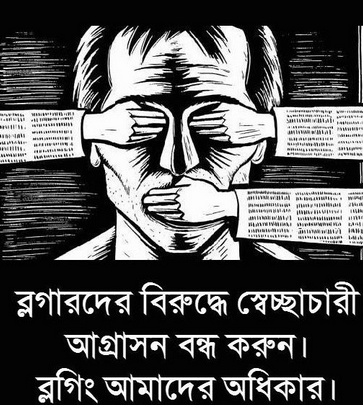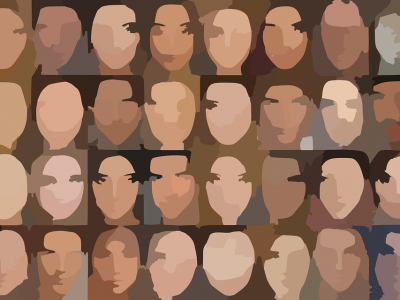Most of this report was researched, written, and edited by Hae-in Lim, Alex Laverty, Renata Avila, Yuqi Chen, Ellery Roberts Biddle, Weiping Li and Sarah Myers.
Global Voices Advocacy's Netizen Report offers an international snapshot of challenges, victories, and emerging trends in Internet rights around the world. This week we begin in Bangladesh, where officials are considering new terms for the country's ICT law.
National Policy
Lawmakers in Bangladesh voted to approve amendments to the country's Information and Communication Technology law, which targets a range of activities broadly defined as cybercrime. If the changes are enacted, the law will now criminalize “destroying computer data with malicious intent, transferring data without proper authority, hacking, and releasing vulgar and defaming information in electronic form.” It will also allow authorities to arrest any person suspected of violating the law without a warrant, so long as he or she is brought before a court within 24 hours of arrest.

“Stop authoritarian aggression against bloggers. Blogging is our right.” Image courtesy Asif Mohiuddin.
Thuggery
In Azerbaijan, websites of the Institute for Reporters Freedom and Safety and Azadliq, an opposition newspaper, sustained DDoS attacks last week. Azadliq management asked the Azeri Ministry of National Security to investigate the attacks, but they report that no action has been taken as of yet.
Chinese netizens saw a wave of arrests last week, on the tails of the trial of ex-official Bo Xilai. The South China Morning Post reported that digital activist Zhou Lubao, who helped expose corrupt activities of Lanzhou mayor Yuan Zhanting, disappeared after being summoned for questioning by police in his home province of Jiangsu. Also detained were Liu Hu, who called for an investigation of Chongqing’s former vice mayor on allegations of mismanagement of public funds, and Internet entrepreneur Charles Xue, a US citizen who has been accused of soliciting prostitution.
Free Expression
On major chat and social network platforms in Thailand, law enforcement officials are now monitoring users whose messages include keywords such as “coup”, “monarchy”, “drugs”, “prostitution”, and other terms deemed relevant to national security. In an interview with Thai daily newspaper The Nation, Police Major General Pisit Pao-in warned users: “[You may be arrested] if you ‘like’ a message deemed damaging to national security. If you press ‘like’, it means you are accepting that message, which is tantamount to supporting it. By doing so, you help increase the credibility of the message and hence you should also be held responsible.”
The Huffington Post announced that it will no longer allow anonymous commenting on its site. “Anonymity is not freedom,” according to Huffington Post contributor Bryan Appleyard, who thinks that treating anonymity “as an aspect of freedom” is an “extraordinary perversion, a reduction of our humanity.” Responding in a blog post, Paul Bernal lists the reasons why this “chills” free speech, claiming that real name policies “help the powerful against the vulnerable, to exacerbate existing power imbalances and to further marginalise and alienate those who are already on the fringes.”
Internet Governance
A coalition of digital rights groups have renewed efforts to influence the agenda of the United Nations Committee on Science and Technology for Development which will explore issues concerning global Internet governance later this year. Led by India-based NGO IT for Change, the group is urging the committee to discuss the democratization of Internet governance in the face of a chronic power imbalance in this area. IT for Change will be accepting signatures to the petition through August 29.
Netizen Activism
IT Ministry officials in Pakistan recently announced plans to implement a nation-wide Internet filtering system for the country. Pakistani NGO Bolo Bhi, which promotes free expression online, has issued a statement demanding that government agencies respect the constitutional and universal human rights of Internet users in Pakistan and disable the filters immediately.
The Philippine government has shown signs of willingness to improve transparency and tackle corruption in response to online campaigns targeting corruption and poor governance.
Copyright
Comcast is threatening to sue TorrentFreak, a web publication that covers Pirate Bay, MegaUpload, online copyright law and regulation, and other file sharing news. Comcast claims that TorrentFreak has violated copyright by publishing public court documents on its website. The documents connect a Comcast subscriber to a pirate-baiting scheme.
Surveillance
In response to the US seeking extradition for Kim Dotcom on charges of mass piracy, New Zealand passed a law that allows its main intelligence agency, the Government Communications Security Bureau (GCSB) to spy on its own residents and citizens. Companies such as Google, Facebook, and Microsoft voiced concern about the bill. In its submission to a parliamentary committee, Facebook wrote, “Blanket rules requiring data retention and accessibility are blunt tools, which have the potential to infringe on civil liberties and constrain economic growth.”
Cool Things (& Shameless Plugs)
Blackbar, a text-based game that revolves around the concept of censorship, challenges users to figure out the censored words in communiques set in a dystopian future. As you progress, the redaction becomes more severe. A potential must-have for future readers of classified documents.
Global Voices’ RuNet Echo team author Daniel Kennedy wrote a profile on Russian blogger Alexey Navalny, who is currently running for mayor of Moscow and also facing trial for embezzlement. Great reading for anyone who wants to follow the Navalny story, but can't parse Russian politics.
Publications and Studies
- “The gatekeeper’s keys: the strategy of intermediaries on the Internet and the impact on the digital surroundings” CELE, Univerity of Palermo, Argentina (Spanish only)
-
“On the Divide: Press Freedom at Risk in Egypt” by the Committee to Protect Journalists
Subscribe to the Netizen Report by email
For upcoming events related to the future of citizen rights in the digital age, see the Global Voices Events Calendar.



